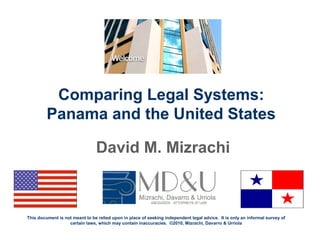Second presentation panama us
- 1. Comparing Legal Systems: Panama and the United States David M. Mizrachi This document is not meant to be relied upon in place of seeking independent legal advice. It is only an informal survey of certain laws, which may contain inaccuracies. ┬®2010, Mizrachi, Davarro & Urriola
- 2. The Panamanian Legal System Civil Law Jurisdiction Single Sovereign Jurisprudence not binding ŌĆ£Probable DoctrineŌĆØ One Constitution ŌĆō Supremacy Rule Codes (Civil, Commercial, Tax, Family, Judicial, Mining, Administrative) Special Laws (Banking, Securities, Oil & Gas, Negotiable Instruments, Corporations, Foundations, Social Security, Public Services, Gaming, Antitrust and Consumer Protection)
- 3. The United States Legal System Common Law Jurisdiction Multiple Sovereigns Jurisprudence binding ŌĆ£Stare DecisisŌĆØ One Federal Constitution ŌĆō Supremacy Rule Several State Constitutions Federalism / States Rights Commerce Clause Federal Laws - US Code ŌĆō Code of Federal Regulations State Laws ŌĆō State Statutes - State Codes Federal Courts State Courts
- 4. The United States Legal System Federal Court Jurisdiction Federal Law Issues Diversity of Citizenship U.S. Supreme Court Review Conflict between Circuit (Appellate Courts) US Constitutional Matters Writ of Certiorari Lifetime appointment of Federal Judges
- 5. Shared General Features Ease of incorporation Modern body of commercial laws Strict regulation of banking, insurance and securities Few restrictions on foreign investment in the services and industrial sectors Few restrictions on property ownership by foreigners
- 6. General Features (ŌĆ”/) Minimal government interference in non regulated industries Freedom to contract Individual freedoms Trends toward arbitration law
- 8. Issues Facing Lawyers Supreme Court Regulation in Panama State Supreme Court Regulation in the United States National Bar Admission in Panama No mandatory association membership State Bar Admissions in the United States Mandatory association membership Hourly Fees - Preferred in the United States Value Based Fees ŌĆō Preferred in Contingency Fees Panama ŌĆō Trend Changing in the United States
- 9. Dispute Resolution Court Systems Arbitration - Mediation Constitutionally Sound Quick Flexible Enforceable Professional Granted full faith and credit International or Domestic
- 10. Recommendations for doing business across borders Find a reliable trading partner Conduct due diligence Research the Market PUT IT IN WRITING! Include Arbitration THINK REGION! Request guarantees (personal real and documentary)
- 11. Calle 58 y Avenida Samuel Lewis Torre ADR Oficina 6-C Panama, Republic of Panama Tel. 011-507-263-0604 Fax 011-507-263-2581 www.mdulegal.com
- 12. The preceding presentation is not meant to be relied upon in place of seeking independent legal advice. It is only an informal survey of certain legal considerations, which may contain inaccuracies. The Author and his firm disclaim any responsibility for its accuracy, fairness, reliability, or contents. No representation is made as to the legal and/or tax consequences of any of the concepts herein described. The reader is specifically warned not to rely on its contents and to seek professional advice from a licensed attorney in Panama. The hiring of an attorney is an important decision which should not be based on advertising and/or publications alone. Should you be interested in learning more regarding the AuthorŌĆÖs qualifications, you will be provided with additional information free of charge upon request. (┬® 2010, Mizrachi, Davarro & Urriola)












